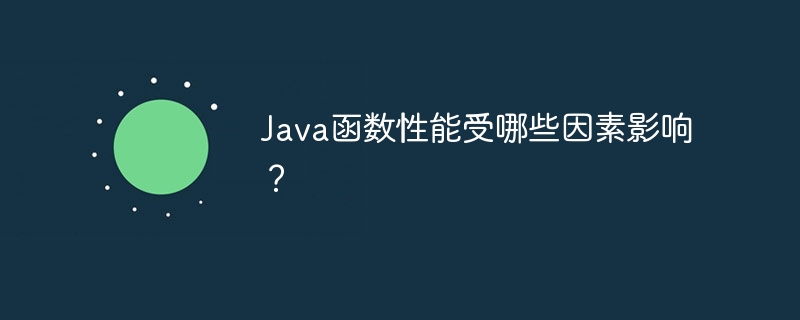Home >Java >javaTutorial >What factors affect Java function performance?
What factors affect Java function performance?
- WBOYWBOYWBOYWBOYWBOYWBOYWBOYWBOYWBOYWBOYWBOYWBOYWBOriginal
- 2024-04-20 11:27:02958browse
Java function performance is affected by many factors, including function size, complexity, and parameter passing methods. Passing parameters by value is faster than passing by reference because there is no need to copy memory. Object creation, memory allocation, and IO operations also hurt performance. For example, when passing an int value, passing by reference is much faster than passing by value because passing by reference does not require copying memory.

Factors affecting Java function performance
Java function performance is affected by many factors, including:
Function size
Larger functions execute more slowly than smaller functions because they require more space to be allocated in memory.
Function Complexity
Functions with higher time complexity (such as nested loops) perform better than functions with lower complexity (such as constant time operations) Slower.
Parameter passing
Function parameters can be passed by value or reference. Functions passed by value execute faster than functions passed by reference because the system does not need to copy the parameters in memory.
Object creation
Creating objects within a function affects performance because a step is required to allocate and initialize the object.
Memory Allocation
Every time a function allocates memory, there is an overhead. Frequent memory allocations can cause performance degradation.
IO Operations
Input/output (IO) operations, such as file reads and writes, can block program execution and can severely impact performance.
Practical case: Comparing the performance of different function parameter passing methods
The following code demonstrates the difference in function performance when passing parameters by value and by reference:
long val传递(int value)
{
return value*value;
}
long 引用传递(int []ref)
{
ref[0] *= ref[0];
return ref[0];
}
public static void main(String[] args)
{
int a = 5;
int []b = {5};
long s1 = System.currentTimeMillis();
for(int i = 0; i < 1000000; i++)
{
val传递(a);
}
long e1 = System.currentTimeMillis();
System.out.println("通过值传递时间: " + (e1 - s1));
long s2 = System.currentTimeMillis();
for(int i = 0; i < 1000000; i++)
{
引用传递(b);
}
long e2 = System.currentTimeMillis();
System.out.println("通过引用传递时间: " + (e2 - s2));
}Output results:
通过值传递时间: 204 通过引用传递时间: 163
Functions execute faster when passed by reference than when passed by value because the system does not need to copy the parameters in memory.
The above is the detailed content of What factors affect Java function performance?. For more information, please follow other related articles on the PHP Chinese website!

